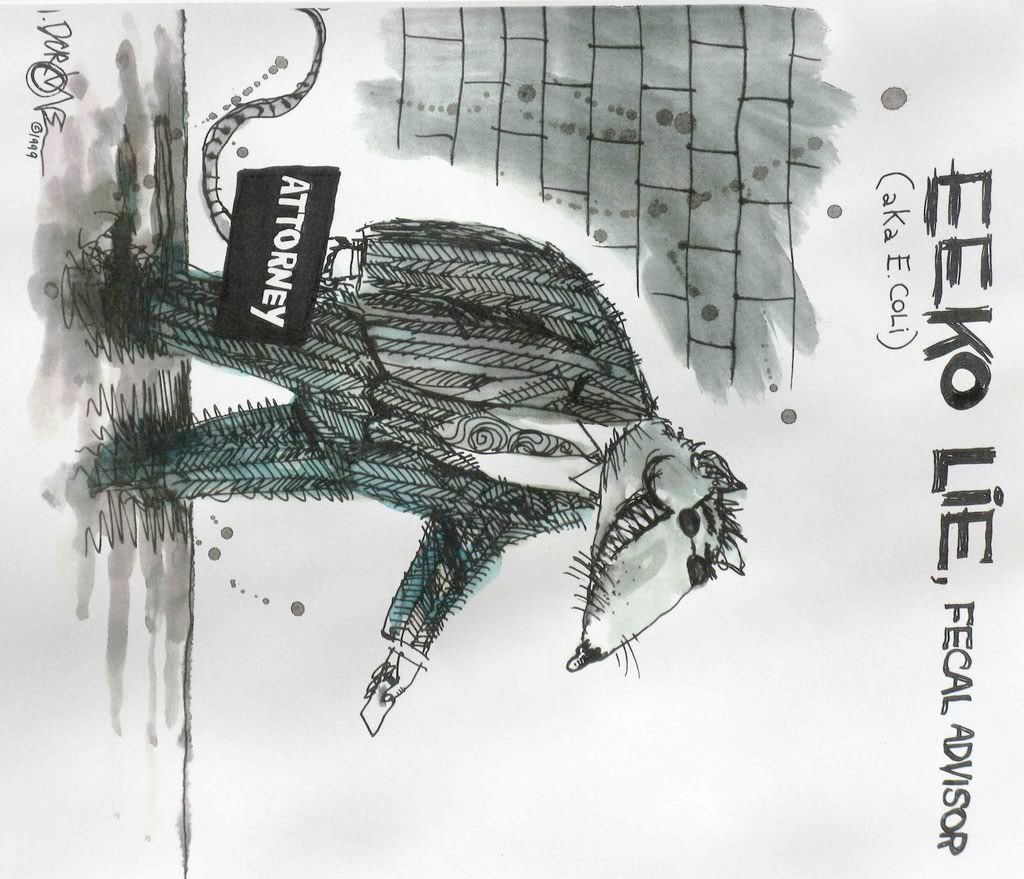 Raw Milk In Washington State Sickens Three People
Raw Milk In Washington State Sickens Three PeopleRetail sale of raw milk is legal in Washington State. But that doesn't mean drinking it is risk-free. Raw milk produced by the Dungeness Valley Creamery has been linked to three cases of E. coli infection, according to a report issued today by the Washington State Department of Agriculture (WSDA).
The same strain of E. coli that sickened these three individuals was also found at the dairy – although it was not detected in a current batch of unpasteurized Dungeness Valley milk. The WSDA news release implies, but does not explicitly state, that the illnesses are due to E. coli O157.
The controversy that surrounds retail sale of raw milk shows no sign of letting up. Proponents cite the perceived health benefits of consuming milk that has not been "cooked" by pasteurization. Opponents cite the risks of food poisoning due to Salmonella, E. coli O157:H7, Listeria monocytogenes, Campylobacter, and other pathogens that have been associated with raw milk in the past.
Perhaps there is no practical way at all to furnish microbiologically safe raw milk to those consumers who want it. Perhaps its retail sale should simply be outlawed everywhere. One thing, though, is clear. Our national patchwork of raw milk regulation – and non-regulation – is not working.
Last month, I proposed that FDA permit – and stringently regulate – the retail sale of raw milk, on the grounds that there is no other sensible way to ensure its safety. Without a nationwide raw milk safety code, consumers will continue to be at risk of illness from this poorly regulated food.
That's my opinion, anyway. What's yours?





While you make a point, I believe that this is risk to the consumer alone. Should they choose to drink un-pasturized products, they should absorb all the risk and producers, distributors and vendors should not be held responsible unless they are found negligence of any aspect of thier duties.
ReplyDeleteConsumer beware - you drink it and get sick, you're responsible. Unfortunately, in this sue-happy society, it's always everyone elses fault for your choices. But that gets into other things...
@ Anonymous: Since many, perhaps all, raw milk producers are claiming that the product is healthy and is from a clean establishment, heck yes, they are responsible when people become sick.
ReplyDelete@ Dr. Entis: I respectfully disagree, although I fully understand where you are coming from. I honestly don't think that the raw milk related illness outbreaks would decrease in either number of severity if the FDA regulated interstate sales. The FDA is having a hard enough time with the products that are already under their regulation.
I think that several factors could result in increased illnesses and outbreaks: wider distribution of raw milk products; an increase in consumers of raw milk who previously had no access to it; increased risk of cross contamination of pastuerized products; and a potential increase in poor production practices because of higher demand.
I'm not sure that FDA inspection and regulation would be able to keep up with the increased demand for raw milk that would result from legalizing interstate sales and distribution. I do understand and respect your opinion, however.
@Anonymous who posted Dec 2: Producers of raw milk make the health benefits a major selling point. IMO, this places both a legal and a moral responsibility for furnishing a microbiologically "safe" product squarely on their shoulders. Yes, consumers are responsible for researching their food choices, but what about the children who drink raw milk that is provided to them by their well-meaning parents who believe the health claims of the raw milk providers?
ReplyDelete@Anonymous who posted Dec 3: I understand and share your concerns. I didn't make this proposal lightly or without many inner qualms. But I am increasingly convinced that the present system is not working, and will only get worse as individual states make a hodge-podge of decisions on the subject. Only by developing a national standard (analogous to the PMO) can their be a semblance of regulatory control. I recognize that FDA is stretched very thin. But that didn't stop the agency from seeking the authority to regulate tobacco products, for example. Thanks for sharing your thoughtful comments.
@Anonymous #1: The reality is, whether you agree or not, food producers do have a responsibility to provide safe food to consumers. If they don't, they can be legally liable for illneses or injury caused by consumption of the food.
ReplyDelete@Dr. Entis: I appreciate and understand your position. My opinion is partly based upon a visceral reaction: I don't want unpasteurized dairy products in the stores where they could cross-contaminate pasteurized products, especially at Mom and Pop retail establishments. Those places usually don't have a lot of refrigeration space, and would be very likely to sell raw milk products in the vicinity of pasteurized products.
Many stores, both large and small, don't remove damaged and leaking milk packages from their coolers and don't clean their coolers very often. I don't knowingly buy food that has drippage on it, but other people may not be so careful. A person in a hurry may accidentally buy and consume raw milk without reading the package. I'm being alarmist, but just the thought of that...stuff at my local stores makes me squeamish.
I just can't fathom that the FDA and local and state health departments would be able to keep up with the raw milk dairies and with enforcement of whatever regulations would allow the interstate sale of raw milk products.
I agree that the patchwork of regulation is not working. I don't know what the answer is, honestly. I live in a state where the intrastate sale of raw milk for human consumption is illegal. I know from personal experience that the State Board of Animal Health looks the other way when small dairies and groceries violate the law.